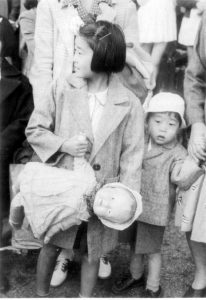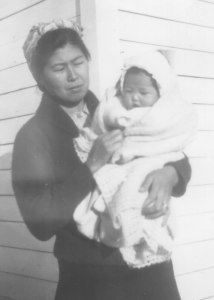Hard Choices
Family Separation
Removed from their homes and stripped of their belongings, the pain of losing everything intensified. Many families were separated from their male relatives. Men between the ages of 18-45 years old were subjected to forced labour on Canadian highways and other work camps. Men deemed “trouble-makers” were sent, along with European prisoners of war (PoW), to camps like Camp #101 in Angler, Ontario. Examples of “trouble” included violating curfew or protesting family separation.
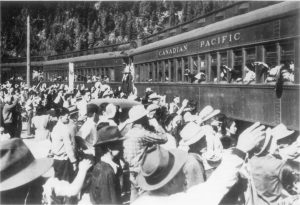
Japanese Canadians on their way to ships which would take them to Japan, c. 1946, Exiles in Our Own Country, Courtesy of Addie Kobayashi.
For some, the injustices of expulsion combined with personal tragedy. Hattie Tanouye’s husband died suddenly from leukemia. She and her three children, all under the age of five, were left on an Alberta sugar beet farm. They shared cramped quarters with her in-laws.
With no future in Alberta, Hattie’s family urged her to join them in St. Catharines. A journey across Canada to find work as a single mother of three young children was formidable. She made the heartbreaking choice to leave her two oldest daughters with her in-laws.
It was pretty scary bringing a baby with diapers as I couldn’t do any washing or anything … it was three days on the train and we had to transfer … I was afraid I was going to get left behind.
– Hattie Tanouye
She did not know or recognize her younger brother, who greeted her at the train station.
At the age of 62, Mr. Onodera, Sally Ujiye’s father, was sent to a road camp. He never returned. That July he died in a landslide while working on the highway. The B.C. Security Commission planned to bury him at Gosnell. They refused to pay the full cost of transporting his body to Vancouver for a proper funeral. To which Sally reacted, “Fine, I’ll beg, borrow or steal the money”.
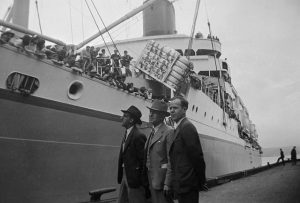
Japanese Canadians being sent to Japan after the war on U.S. Army transport S.S. GENERAL M.C. MEIGS at C.P.R. Pier A – Library and Archives Canada / PA-119024
Japanese Canadians were kept in internment camps even after the war. In the winter of 1945-46, the government gave Japanese Canadians two hard choices: find a place in Canada east of British Columbia or leave for Japan. Nearly 4,000 people were exiled to Japan. The majority of those sent to Japan were Canadians, had never been to Japan, and did not speak Japanese.
Coming to Japan, our only means of support was the $200 provided by the government of Canada. This meagre amount … did not go far in the face of food shortage and rampant inflation sweeping Japan. Struggling to rise from its defeat in the war . . . a large number of repatriates died from poverty and malnutrition.
– Roy Ito, Stories of My People
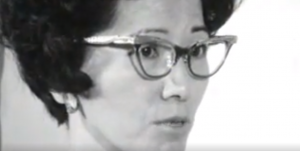
View these CBC video archives: Interview on the relocation experience for a Japanese Woman (no closed-captions).
(Japanese-Canadian Internment, CBC, 1968)
Asian woman: When I discovered an Occidental friend of ours, neighbours of ours on the island, let me know through telegram that they were coming down, I went to meet them. It was a Union Steamship boat called Chelosin. And I went to meet them down at the docks, and my mother came down with a huge bouquet of flowers that her Occidental friends had given her. She looked like a bride. And she came off the boat, my little brother was with her, and my father, and I tried to um…When they came down the gangplank, I went to rush to them and a policeman stopped me and then a huge band, I think they were policemen or RCMP or something; people like that were on the van and they moved right up, and they were taken right in. We couldn’t even, they wouldn’t even allow us to say hello to each other
Unseen interviewer, in the background: And how old were you at the time?
Asian woman: I was about sixteen, seventeen at that time. And they were herded right into the, um, van, and taken away. And I just stood there and uh, well I didn’t know what to think. And the people around were looking at me and well of course they would think, ‘Are they criminals or what?’, and I didn’t know what to make of it. I remember rushing around frantically, trying to find an official or someone that I could ask where they were going and how I might be able to see them. And, uh, they said my parents were being taken to Hastings Park and that…
Unseen interviewer, in the background: That’s a racetrack, is that right?
Asian woman: That’s right. And I didn’t know how they’d be housed until later on there. But they told me they were being taken there and that I would eventually be able to see them there.
(Video panes to Caucasian male interviewer, then back to the Asian woman)
Asian woman: I think it was about…perhaps two weeks later, I had tried to find ways of getting to see them, but I remember hearing that we’d be able to see them over the park. And about two weeks later it seems to me, it was a very cold, miserable, sleety day, and I went out there on a Sunday, and, and um there were many others there, seeing other people who were put inside the fence, uh, fenced in in Stanley…Hastings Park. And it was locked and guarded, and no one could go in and no one could come out. And I remember I finally found my father and my mother, and my brother, and all we could do was to put our fingers through the mesh and, uh, touch each others’ fingers; that was our only contact. And, uh, when we finally got in to see my mother, I found that they were, that she was, along with hundreds of others, installed in these horse stalls. And what kind of building would that be?
Unseen interviewer, in the background: Well, I supposed where they kept the horses, the racehorses, for the racetrack.
Asian woman: Right, something like that. And everything was cold and drafty, and there was no privacy. And mother had put up, uh, I think bedspread across the opening, and she was on one of these bunks in there. And she had…the smell was something terrible. They…It was a very horsy smell around.
Unseen interviewer, in the background: Right.
Asian woman: And uh, she had said, and all the people around had tried to clean the stalls out, but they couldn’t get between the cracks of the bars and so forth…And, uh, it’s no wonder that many people caught colds while they were there; people got sick.
(Video and camera angles change; the Asian woman and the Caucasian male interviewer are now both fully in the frame. The woman and man are sitting on different couches close together with their legs crossed.)
Interviewer: How did the Occidental people in Vancouver treat you?
Asian woman: I think…among the people, that I had always lived, that I’m sure most of them remained the same. But I do know that I feared actually, going out onto the street and taking public conveyances, because that’s where I met strangers who, um, brought home so much the fact that I wasn’t a Canadian.
Interviewer: How did they do this?
(Video and camera angles change as it focuses on the Asian woman again. The camera zooms in on the Asian woman; the Caucasian male interviewer is no longer visible)
Asian woman: Well, I remember getting on the bus, the bus was one of travelling. Well, it was a streetcar at that time, and often a lady or a man would come up and say, ‘What are you, a Japanese or a Chinese?’ And if I said, “I’m Japanese” they would say, ‘It’s a terrible thing what your people are doing over there.’ And then, um, they would move away and sit in another seat and leave me high and dry by myself on a seat. Or anybody could stop you in a store or the street and tell you ‘That’s a terrible thing your people are doing over there, and, um, you should all be sent back to Japan.’ And, uh, up until then I always thought of myself as a Canadian, and the people of, the Japanese people in Japan, they were ‘they’, THEY were Japanese, and I was Canadian
Unseen interviewer, in the background: Sure. You were born here.
Asian woman: I was born here and felt Canadian, and I never thought of myself as a Japanese, except that I was a Canadian of Japanese descent.
Unseen interviewer, in the background: [Indecipherable] here…[indecipherable] a thousand Japanese people coming in, how did they react to you? Kaslo.
Asian woman: I would imagine that they were very much afraid. They didn’t know what the Japanese were like. They would only know…I don’t think they’d ever seen one before. And so, I would imagine they had great qualms and maybe even fears of what they might be like because all they knew of, uh, about Japanese was what they had read or heard and they weren’t always very good.
(Camera switches to Caucasian male interviewer)
Interviewer: Yeah. What did you do here in Kaslo during the war years?
(Camera switches back to the Asian woman)
Asian woman: Oh, I taught Sunday school, and I taught school. I wasn’t a trained teacher, I had just graduated myself; I hadn’t really completed my university education – that is university entrance I meant. But people like me were recruited to teach because there was no school for the children and um, the parents were most anxious the children have school.
Unseen interviewer, in the background: Schools were segregated? They didn’t allow the Japanese children…
Asian woman: That’s right. There was a local school, but the Japanese children couldn’t go there. I think it’s only fair to say one reason was that there wasn’t, they couldn’t accommodate them; the school was small.
Unseen interviewer, in the background: I heard something about a flag that you had in the school?
Asian woman: *Laughs quietly* Yes, my flag is the Canadian flag, uh, the Union Jack at that time, and uh, I as a teacher was determined that, um, my children, my students, would grow up knowing their flag and knowing that they were Canadian, that they were never to think that what they were by racial origin. And we used to sing the Ma…um, O Canada and God Save the Queen every day, and I had the Union Jack pinned above the board in my classroom. And my classroom was right off the street, a downtown street in Kaslo, and I think someone going by peeked in and saw the flag there. And, uh, she was a local resident and resented the fact that I with my black eyes, I guess, had no right to that flag and reported me to the BC Security Commission and the, um, RCMP and demanded that I take that, that I be made to take that flag down.
(Camera pans to the Caucasian male interviewer nodding, then directly back to the Asian woman)
Asian woman: And of course, I was called to the office and told to take that flag down because, well for, I guess, peace sake? And for public relations, I think. But I did stand my ground and I said, ‘That is my flag, I am a Canadian and I won’t take it down.’ And uh, I think I was probably asked to take it down again and I said ‘No, I won’t take it down.’ And I said, ‘What do you think I should replace it with? What do you think is my flag? And why is it wrong for me to have that flag up there?’ And eventually he said, ‘Well I think you’re right’, and I was able to keep it there. And it stayed there for the duration.
(Camera angle switches to the Caucasian male interviewer)
Interviewer: Were you ever mistreated, or treated roughly?
(Camera angle switches back to the Asian woman)
Asian woman: Do you mean physically?
Unseen interviewer, in the background: Yes.
Asian woman: Actually, I don’t have a recollection of any mistreatment or…to me, or hearing about mistreatment of others, but I think that if there were mistreatments or suffering, I think it was more mental than physical. And mental of course, there’s no yardstick for measuring that kind of, uh, suffering.
Unseen interviewer, in the background: In what way mental?
Asian woman: Um, wanting to know what was happening, why, and…Oh one thing I remember, wanting to visit our doctor friend in Lemon Creek, applying for a permit to visit him, and his family. And I applied at the BC Security Commission and had to give my reasons and so forth. And then I was directed to see the RCMP officer in charge here and had to go through the same thing. And then they had to apply to the coast, to the BC Security Commission and be cleared by the RCMP down there. And if they felt your reason for wishing to go was urgent enough, you were granted the permit, a travel permit. And then *laughs* your trouble started after that.
Unseen interviewer, in the background: In what way?
Asian woman: Well, after going through all this and waiting weeks for your permit, when the permit arrived, you had to go to pick it up of course. And then you had to tell when you were leaving, I think our bus here used to leave at 6 o’clock in the morning, and there would be an RCMP officer waiting to load you on or see that you got on. But before you left, before you were allowed to get on the bus, you had to produce your…Well I’ll just say ‘I’ because I’m talking about my experience, I had to show my card…identification card that all Canadians or Japanese or anybody of Japanese origin were issued with these cards during this war, and we had to have it with us all the time. It had our picture, our thumbprint, and identification things on there. And we had to show this to the RCMP, and he would stamp it, give it back to you, with everybody staring at you. And then after, I’ll go back to ‘I’ again, after I left Kaslo, then the bus stopped…I don’t know exactly where it was, but a few miles out of Kaslo, and there was a little…like a telephone booth there. It was a checking out place for the RCMP, and the bus drew up there. I had to produce my identification card, Enemy Alien Card, and then he would stamp the card and give it back to me while all the passengers watched and waited. And then I would feel very small, and I supposed all the passengers wanted to ask me what all this was all about, and I was hoping I’d make myself look as small as I could and look down or look away so nobody would ask me why. And then in uh, Nelson, when we’d get in there’d be an RCMP officer waiting for the bus there and he would take me off, go through the same thing, and then he would say, ‘When are you leaving Nelson’ and I would give him the time, the bus, and then he’d be there to see me off, return my card to me stamped, and they know that within so many minutes I would be at the next checking out point. And I was checked all the way in to Sulcan city or Lemon Creek and as soon as I got to Lemon Creek there’d be another officer there, I supposed to make sure I didn’t get off the bus somewhere and bomb a dam or something *laughs*.
Unseen interviewer, in the background: I can see how this would cause a great deal of psychological and mental anguish. But there must’ve been another one, too, the deportation proceedings, the pressure put on the Japanese people here.
Asian woman: It’s one of those things that I wish had never happened, and for a long, long time it gave me nightmares, I’ll have to admit. At the end of the war, the people who were still left in BC were given two choices. There was no third choice. Either you signed to remain in Canada, which meant automatically you must accept one of the jobs that were lined up, that were in these books that they showed, that were on the desk at the same time when you went to sign up. If you chose to remain in Canada, it meant that you had to right there choose which of these jobs you would accept and be moved out immediately.
Unseen interviewer, in the background: What kind of pressure was put on you personally?
Asian woman: Well, at that time my mother was in the hospital, I think I had mentioned before, and my father was away, and I had to make a choice, immediately. And I couldn’t leave my mother in her physical condition, and I would imagine if the family broke up right away that would be the end of the straw for her. And I couldn’t get a hold of my father; there was no communication, quick communication such as telephone or telegram. And so, there were three days in which people of Kaslo could go and sign. And I remember I didn’t go the first day. And the second day, evidently the, uh, all the signing was finished on the second day here. And I still hadn’t turned up, and uh, an officer came up to me and said, ‘You better come and sign up, you’re the last one. We’ve been waiting several hours for you to turn up. You’re the last one who hasn’t come in to sign.’ And I said, ‘I just cannot do it.’ I said, ‘I want to remain in Canada.’ I said ‘Stay in Canada where I was born, but I can’t leave home right now, because of my little brother and my mother and father.’ And he said, ‘Well sign up anyway.’ And I said, ‘Well it doesn’t work that way easily.’ I said ‘I can’t go east and I can’t sign to go to Japan because why sign away your birthright, your own country, to go to a country you don’t know?’


